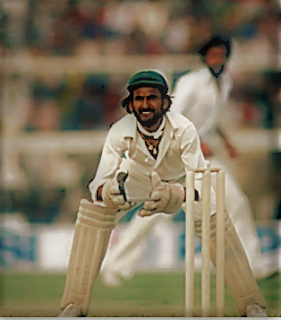Taslim Arif, a right-handed wicket-keeper, represented
Pakistan in six Test matches and two One-day Internationals. He was immensely talented and could have played many more matches for Pakistan than those meagre 6 tests and 2 ODIs. But unfortunately he played in the same era as that of the great Pakistani wicket keeper Wasim Bari. Taslimm Arif's chance of luck came in the year 1980
when the national selectors chose to test a new face after growing frustrated
with Wasim Bari's deteriorating form. During Pakistan's 1979–80 tour of India,
Taslim replaced star batsman Zaheer Abbas in the test match at Kolkata. In the
series, Pakistan had previously lost two tests, and Zaheer Abbas was in the
most awful form of his cricketing career.

On January 29, 1980, at
Calcutta, in the penultimate Test of the 6-match series against India, Taslim
started the batting alongside Sadiq Mohammad. He instantly had a significant
impact on the drew match with scores of 90 and 46 in the two innings, while
Sadiq Muhammad, the other opener, was dismissed after making only 5 and 8 in
both innings.
Taslim topped all scorers in
both innings. Four boundaries were part of his 90 in the first inning, which he
attained off 268 balls. With four fours, his 46 in the second inning consumed
92 balls. Taslim was successful in getting the selectors' attention, and they
decided to play Taslim Arif as both an opening batsman and wicket-keeper for
the 1979–80 home series against Australia in place of Wasim Bari.
Taslim opened the innings of
the first Test at Karachi with Haroon Rasheed. In addition to taking two
catches and stumping two batsmen behind the wicket, he scored 58 and 8 himself.
The following six days were the most important of Taslim's brief international
career.
Taslim Arif achieved the
rare feat of being on playing for the whole second Test match in Faisalabad. On
each of the four playing days, this amounted to 20 hours and 8 minutes. The
match's opening day was completely rained out, and subsequent days had intermittent
inclement weather. For 773 minutes (211 overs), he held the wicket as Australia
amassed a first-innings score of 617. Taslim then hit an unbroken 210 as
Pakistan's reply of 382 for two in 435 minutes (126 overs) before the Test
concluded in a dull draw. He batted for a total of seven and a quarter hours,
faced 379 deliveries, and smashed 20 fours after Haroon (21) helped him get off
to an 87-run start.
His association for the
second wicket with Zaheer Abbas (19) was good 72 runs, while his unbeaten third
wicket partnership with captain Javed Miandad (106 not out) was around another
223 runs. In the three Tests versus Australia, Taslim featured. When the third
game in Lahore was about to end in a draw by the way, Taslim entered the field
to bowl his right-arm medium-pace. He dismissed Graeme Beard giving him bowling
stats of 5-0-28-1. Javed Miandad kept wickets while Taslim showcased his
talents with the ball.
He was kept on as the
opening batsman and wicket-keeper for the four-test home series against the
West Indies. He was forced to retire hurt after being struck on the hand by
fast bowler Sylvester Clarke in the second innings of the first Test, which
ended in a draw, in Lahore. In the second game in Faisalabad, he took the field
and was out LBW to Clarke for a third-ball duck. He also performed poorly as a
wicketkeeper as Pakistan was defeated by the West Indies by 156 runs.
Later it was discovered that
he had been playing the Test while suffering from a finger multifaceted
fracture.
Taslim's international
career came to an end at that point. In the third game of the 1980–81 series,
Wasim Bari rejoined the Pakistani squad. He then participated in 25 of
Pakistan's last 28 Test matches before declaring his retirement in 1983–84.
In his six Test matches,
Taslim Arif amassed 501 runs at an average of 62.62, including 102
half-centuries. As a wicket-keeper, he caused 9 dismissals including 6 catches
and 3 stumpings, while as a bowler, he had 1-28. He scored a total of 28 runs
(an average of 14.00) in his two One-Day International matches against the West
Indies in 1980–1981; his highest score was 24, and he also caught and stumped
two balls. For more than 20 years, until Sri Lankan Kumar Sangakkara shattered
the record, his 210* for Pakistan against Australia was the highest score by a
wicket-keeper in a Test match. Before making his debut for Pakistan in
international cricket in September 1978, Arif became the first Pakistani
wicketkeeper to cause 10 dismissals in a first-class match when starring for
National Bank versus Punjab in Lahore. Wasim Yousoufi subsequently surpassed
his record in 1997.

Comments
Post a Comment